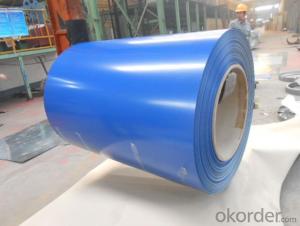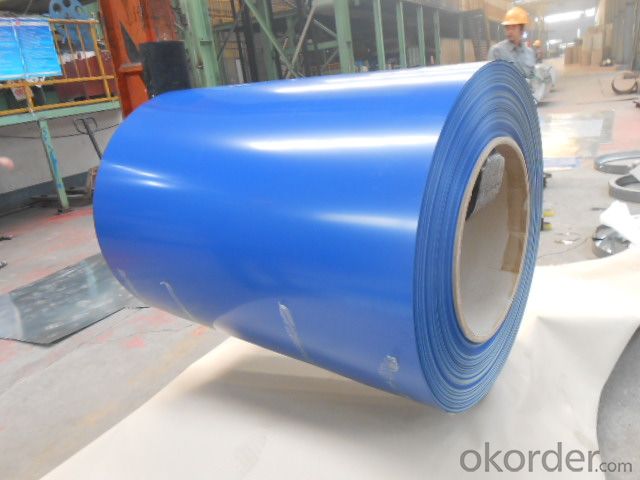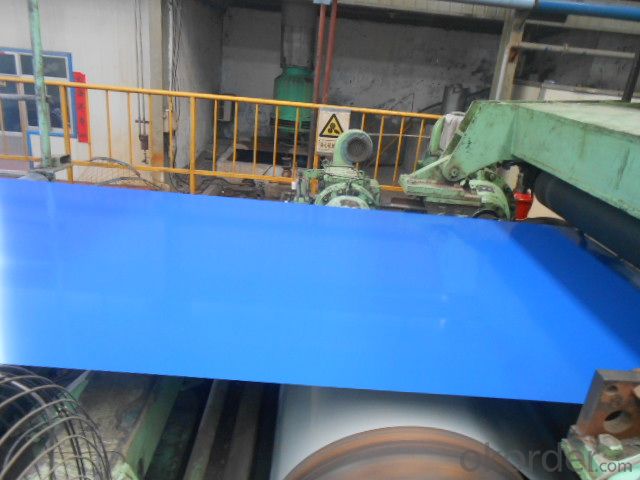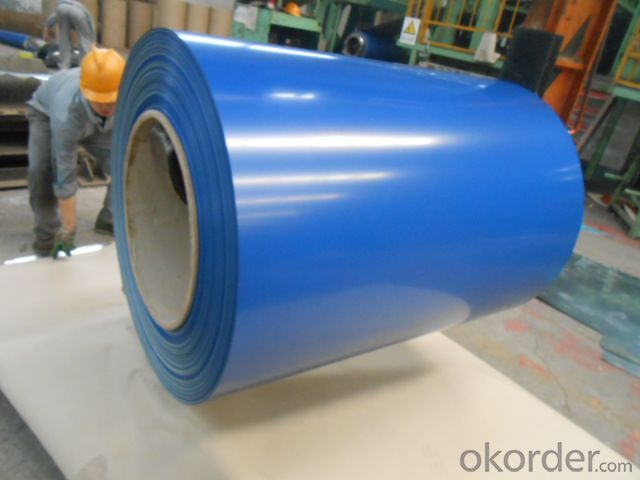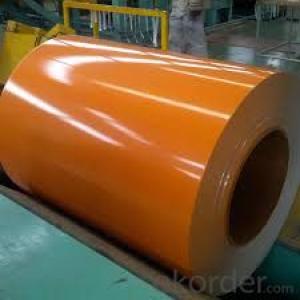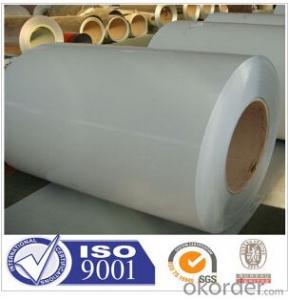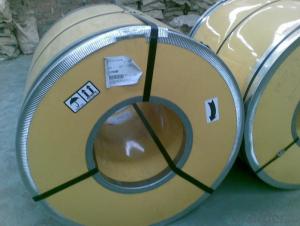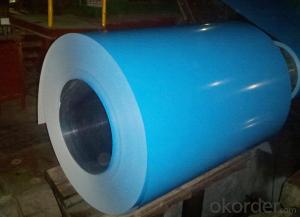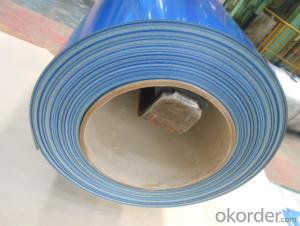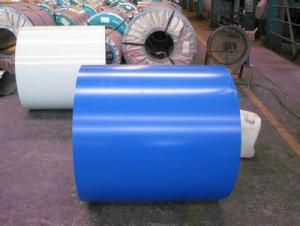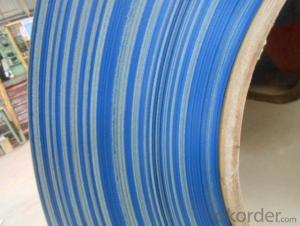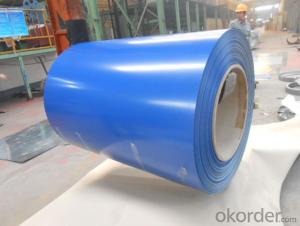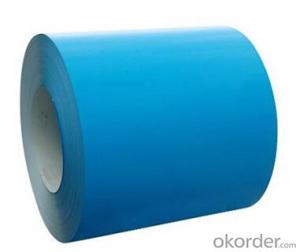Pre-Painted Galvanized Steel Coil in Best Quality Blue Color
- Loading Port:
- Shanghai
- Payment Terms:
- TT OR LC
- Min Order Qty:
- 200 m.t.
- Supply Capability:
- 10000 m.t./month
OKorder Service Pledge
OKorder Financial Service
You Might Also Like
1. Pre-Painted Galvanized/Aluzinc Steel Coil Description:
With GI as base material, after pretreatment (degrease and chemical treatment ) and liquid dope with several layers of color, then after firing and cooling, finally the plate steel is called pre-painted galvanized (aluzinc) steel. Pre-painted galvanized steel is good capable of decoration, molding, corrosion resistance. It generally displays superior workability, durability and weather resistance.
2.Main Features of the Pre-Painted Galvanized/Aluzinc Steel Coil:
• Excellent process capability
• Smooth and flat surface
• Workability, durability
• Excellent heat resistance performance
• High strength
• Good formability
• Good visual effect
3.Pre-Painted Galvanized/Aluzinc Steel Coil Images
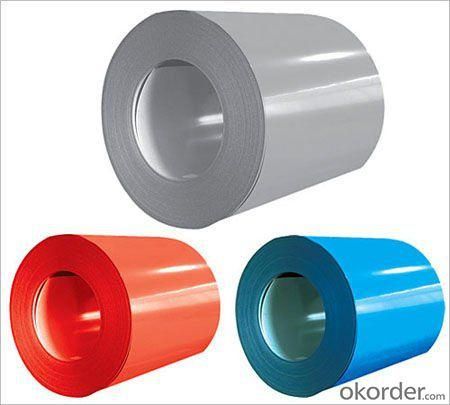
4.Pre-Painted Galvanized/Aluzinc Steel Coil Specification
Standard: AISI, ASTM, BS, DIN, GB, JIS
Grade: DX51D, DX52D
Thickness: 0.17-2.0mm
Brand Name: KMRLON
Model Number: coil
Type: Steel Coil
Technique: Cold Rolled
Surface Treatment: Coated
Application: Boiler Plate
Special Use: High-strength Steel Plate
Width: 20-1250mm
Length: customized
commoidty: pre-painted galvanized steel coil
Thickness: 0.13-4.0mm
width: 20-1250mm
zinc coating: 40-180g/m2
printing thickness: top side: 20+/-5 microns, back side: 5-7 microns
color: all RAL color
surface treatment: color coated
coil weight: 4-7 tons
coil ID: 508/610mm
packaging: standard seaworthy packing
5.FAQ of Pre-Painted Galvanized/Aluzinc Steel Coil
1. What’s the application of this product?
Roof, roof structure, surface sheet of balcony, frame of window, etc.
2. What’s the brand of the paint?
We use the best brand of all of the word—AKZO.
3. How to guarantee the quality of the products?
We have established the international advanced quality management system,every link from raw material to final product we have strict quality test;We resolutely put an end to unqualified products flowing into the market. At the same time, we will provide necessary follow-up service assurance.
4. How long can we receive the product after purchase?
Usually within thirty working days after receiving buyer’s advance payment or LC. We will arrange the factory manufacturing as soon as possible. The cargo readiness usually takes 15-25 days, but the shipment will depend on the vessel situation.
- Q: How are steel coils used in the packaging industry?
- Steel coils are used in the packaging industry to create sturdy and durable packaging materials, such as metal drums, cans, and containers. The coils are unwound and shaped into the desired form, providing a strong and protective barrier for various products during storage and transportation.
- Q: How do steel coils contribute to the manufacturing of agricultural machinery?
- The manufacturing of agricultural machinery heavily relies on steel coils, which play a vital role in this process. Typically, these coils are crafted from top-notch steel that possesses exceptional strength, durability, and resistance to corrosion. To begin with, agricultural machinery heavily relies on steel coils for the construction of its main structural components, including the chassis, frames, and supports. These components must endure heavy loads, extreme weather conditions, and rough terrains. Thanks to the strength and resilience of steel coils, the machinery can effectively handle these challenging environments and operate efficiently. In addition, steel coils find application in the production of various moving parts and mechanisms within agricultural machinery. For example, gears, shafts, and axles, which are crucial for power transmission and rotational motion transformation, are created using steel coils. The high tensile strength and excellent machinability of steel make it an ideal material for these essential components, ensuring their reliability and longevity. Moreover, steel coils contribute to the manufacturing of agricultural machinery by providing a protective layer against wear and tear. Often, these coils are coated with specialized finishes or paints to enhance their resistance to rust, chemicals, and abrasion. This protective layer significantly prolongs the machinery's lifespan, reduces the need for frequent maintenance and repairs, and ultimately increases its overall efficiency and productivity. Furthermore, the versatility of steel coils allows for customization and adaptation to meet the specific requirements of agricultural machinery. Manufacturers can shape and mold the coils into different sizes and dimensions, enabling the production of machinery suitable for various farming practices and applications. Whether it's tractors, harvesters, or irrigation systems, steel coils are crucial for creating versatile and dependable agricultural machinery. In conclusion, steel coils are essential in the manufacturing of agricultural machinery due to their strength, durability, resistance to corrosion, and customization capabilities. From structural components to moving parts and protective coatings, steel coils greatly contribute to the efficiency, reliability, and longevity of agricultural machinery, thus providing significant support to the global agricultural industry.
- Q: How are steel coils used in the manufacturing of automotive body panels?
- Steel coils are used in the manufacturing of automotive body panels by being processed and shaped into the desired form through techniques like stamping or roll forming. These coils provide the raw material for creating strong and durable body panels, ensuring the vehicle's structural integrity and safety.
- Q: Is steel framing eco friendly? Why or why not.
- No because unlike the timber in trees, it is not a renewable resource and takes much heat energy to produce.
- Q: How are steel coils used in the manufacturing of cables?
- Steel coils are commonly used in the manufacturing of cables to provide strength and support. The steel coils are typically wrapped around the cable core to enhance its structural integrity, increase tensile strength, and protect against external forces. This reinforcement allows the cables to withstand tension and bending, ensuring their durability and reliability in various applications such as power transmission, telecommunications, and construction.
- Q: could anybody tell me the the weight of a cubic metre of mild steel? and where to get this info from?
- Weight per meter kg/m kg/m = (Oc - 4Wt) * Wt * 0.00785 Oc = outside circuit, Wt = wall thickness For sq. steel tubes: Oc = 4*a For rect. steel tubes: Oc = 2a + 2b Specific Weight =7.85 g/cm3
- Q: How do steel coil manufacturers meet customer specifications?
- Steel coil manufacturers meet customer specifications by carefully analyzing the requirements provided by the customer and utilizing advanced production techniques to ensure precise dimensions, mechanical properties, and surface finishes. They employ strict quality control measures throughout the manufacturing process, including rigorous testing and inspections, to ensure that the coils meet the specified standards. Additionally, manufacturers often collaborate closely with customers to understand their unique needs and provide customized solutions that meet or exceed their expectations.
- Q: How are steel coils used in the agricultural industry?
- Steel coils are used in the agricultural industry for a variety of purposes, including the manufacturing of farm equipment such as tractors, combines, and plows. These coils are also used in the construction of storage tanks, irrigation systems, and fencing materials. Additionally, steel coils are utilized in the production of agricultural buildings and structures like barns, silos, and greenhouses.
- Q: I am building a robot for Bots IQ. In doing so i have the option of building the the armor of my robot out of titanium or tool steel.. which would be the better option.Brief description of Bots IQ: It is a competition where 2 15lb robots go and attack each other with spinning blades, hammers or whatever is designed.
- Titanium is a significantly stronger and lighter metal, but is also extremely expensive. If you have the option for titanium, go for it.
- Q: What are the key properties of steel coils?
- The key properties of steel coils include their strength, durability, and flexibility. Steel coils are known for their high tensile strength, making them suitable for various applications that require load-bearing capacity. They also exhibit excellent durability, resisting wear, corrosion, and damage over time. Additionally, steel coils are highly flexible, allowing for easy shaping and forming into different structures or products.
Send your message to us
Pre-Painted Galvanized Steel Coil in Best Quality Blue Color
- Loading Port:
- Shanghai
- Payment Terms:
- TT OR LC
- Min Order Qty:
- 200 m.t.
- Supply Capability:
- 10000 m.t./month
OKorder Service Pledge
OKorder Financial Service
Similar products
Hot products
Hot Searches
Related keywords
